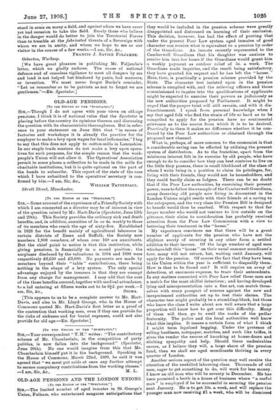[To TIM EDITOR OF THE "SPECTATOR:1
SIR,—Some account of the experience of a Friendly Society with • which I am connected as a director may be of interest in view of the question raised by Mr. Hart-Davis (Spectator, June 13th and 20th). This Society provides the ordinary sick and death benefits, and, in addition, annuities of 5s. or 4s. weekly to those of its members who reach the age of sixty-five. Established in 1828 for the benefit mainly of agricultural labourers in certain districts of Essex and Suffolk, the Society now numbers 1,908 members, of whom over 160 are annuitants. But the chief point to notice is that this institution, while giving pensions, is financially in a sound position ; the surpluses disclosed by the valuations in 1904 and 1899 were respectively 26,650 and 23,090. No payments are made by members beyond their " table " contributions, there being nothing in the shape of a levy system. The only special advantage enjoyed by the insurers is that they are exempt from any charge for management. I may add that the cost of the three benefits assured, together with medical attendance. to a lad entering at fifteen works out to be 6id. per week.—I [This appears to us to be a complete answer to Mr. Hart. Davis, and also to Mr. Lloyd George, who in the House of Commons quoted Mr. Hart-Davis's first letter as a proof of the contention that working men, even if they can provide for the risks of sickness and for burial expenses, could not also provide for old age.—ED. Spectator.]






















































 Previous page
Previous page